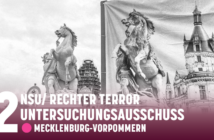The accused Carsten S. is further questioned by the co-plaintiffs’ lawyers. Not much new comes to light today. However, some of S.’s testimony once again begs the question, to what extent must the Office of Constitutional Protection (VS) have been informed by confidential informants like Tino Brandt and other (former) neo-Nazis.
The eleventh trial day begins at 9:50. Like the entire last week, no co-plaintiffs are personally present. The presiding judge Manfred Götzl would like to continue the examination of Carsten S. with the co-plaintiff representatives for the relatives of Mehmet Kubaşık, who was murdered on the 4th of April, 2006. He is immediately interrupted by Johannes Pausch, Carsten S.’s defense attorney. Pausch announces that first his client has something independent to add. S. reports that he was confronted by Daniel S. about the three in hiding after his exit from the scene. Daniel S. had also exited the scene and had, at the time, contact with the Federal Office of Constitutional Protection. Furthermore, he had also spoken with Sandro T. about the three. This must have been very late 2000. T. asked him if he had contact with the three, to which he answered yes. T. was indignant and asked if Tino Brandt knew about it, which S. also affirmed. T. was again indignant. Judge Götzl asks a question at this point. H wants to know if S. and T. spoke further about this subject. S. said no. He could not exactly say how he recognized T’s outrage. He offered the explanation that perhaps T. already knew that Tino Brandt was an informant for the VS. T.’s inquiries occurred odd to S., but he did not continue to think about it, because it was okay for Brandt to know about it.
Next up was the examination by attorney Antoia von der Behrens. She asks S. initially about his new testimony. According to S., the conversation with Daniel S. must have been after his exit [from the scene]in 2000 or 2001. He was not sure if Daniel S. was in the support program for neo-Nazis leaving the scene. In any case, he moved to Berlin, and the move was payed for by somebody [presumably not Daniel S. himself]. He had told S. that he didn’t have any contact with the three, because he didn’t want to reveal anything. That Daniel S. spoke to him about that was weird anyway. Von der Behrens would like to know since when S. reckons he belonged to the scene. S. says he became a member of the Thüringer Homeland Defense (THS) in 1997 at the demonstration in Saalfeld, where there were also stickers from the THS. S. counts Ralf Wohlleben, André and Christian K. as core members of the THS in Jena. When asked, he also counted himself as a core member of the Jena THS. There was no initiation ritual, he just felt like he belonged. He first heard of a ‘fellowship’ in Jena, after the theft of a Flag in Beate Zschäpe’s residence. He couldn’t give details on the “Nationalen Widerstand Jena” [National Resistance Jena], even when confronted with the fact that he had worn a T-shirt with the corresponding inscription. Everyone in the right scene from Jena identified themselves as national resistence. Futhermore, that was already at the end of his ‘active’ time, where he only did two more events out of a ‘feeling of responsibility’ for the younger ones in the Jungen Nationaldemoratin (JN) [Young National Democrats, the youth party associated with the NPD, a political party, often accused of being a neo-Nazi organization]. Von der Behrens confronts S. with his testimony from an earlier interrogation, wherein he said that his work with the NPD very quickly became political work and that they even sat down together with the SPD-mayor twice and discussed with him quite normally. S. answered: “At first, it was interesting with the events, but they were always the same and to that effect, they became boring.” Von der Behrens: “Think about it one more time: what roll did politics and ideology play for you? Playing it down doesn’t’ help much.” S. says he can only “poorly concretize” their roll. In response to Ronny A.’s testimony that S. had called for order in the Bus to Saalfeld, when the rest were fooling around, S. said that alcohol was not allowed, and they had a bottle of liquor. Von der Behrens asks about other NPD events, to which S. mostly answers that he can’t remember. He can’t remember being present at the disruption of a Deutscher Gewerkschaftsbund (DGB) [Confederation of German Trade Unions] event on the 30th of January 1998 in Saalfeld. He also couldn’t remember that he was arranged to be the assembly leader at a “funeral march” in Bad Berka in 2000. He could likewise not explain why he should be planned to be, together with Ronny A., in a televised debate with the Thüringen Home Secretary in September 2000.
Thereafter, questions revolved around how the VS is perceived in the right scene. S. says that he assumed for a long time that Steve H. could be an informant, but that was in error. Von der Behrens asks if the VS was given credit for things like hanging the black-white-red flag from Zschäpe’s residence. S. responds: “ We didn’t’ really differentiate between Police, VS, LKA [State Office of Criminal Investigation]. It re-occurs to me, that the flag lay there, and I took it with me, a bit out of provocation.” When asked if he had concerns after he found out that Tino Brandt was an information – after all, Brandt knew that S. had contact with the three. S. answered he didn’t even think about it. The information in the scene about pending police actions during the Rudolf Hess action week or regarding a potential ban agains the THS came from André K. or Brandt.
S. can’t remember Wohlleben’s racist positions. Von der Behrens confronts S. with the witness testimony of Christina H., wherein she states that Wohlleben and André K. had the “sickest minds.” Eating Döner was punished with ten push-ups, during which one was also whipped. S. said that he had first read that recently. He had never heard of it. S. could not answer if he was Wohlleben’s right hand, as claimed by the co-defendant G.. He doesn’t know Wohlleben’s or the Jena scene’s connections to Sachsen. He knows Christian K.’s band “Eichenlaub” [oak leaves]. He Traveled with Christian K. to a concert in Hoyerswerda once. The song about the three by “Eichenlaub” was unfamiliar to him, but he knew it from the records. He also knew Patrick Wieschke [a Thüringen neo-Nazi, convicted of incitement to assault against a turkish restaurant], but knew about the crime for which he is accused only through media coverage.
Next was the breaking off of contact to the three. He can’t date the last telephone conversation. In agreement with Wohlleben, he canceled the card after he was taken into preventative custody. When he spoke to the three before that, he could not say. When asked, he said that he assumed – he didn’t really think about it – it was the final termination of contact. Von der Behrens: “You maintained conspirative contact over a long period of time with the three in hiding and you sever contact and one doesn’t talk about how contact will go in the future. I find that a bit out of touch with reality.” S. said that for him it was settled, because the card was put back during the search in accordance with preventative custody.” Von der Behrens: “So it was purposefully not seized?” S.: “That was a possibility.” S. couldn’t give an exact date to his exit from the scene, but it was probably within three or four weeks after the preventative custody. He also spoke one more with Wohlleben about it. Finally, attorney Von der Behrens showed him the findings of the Federal Office for the Protection of the Constitution, according to which S. refused an exit-program offer [an offer of support in leaving the right wing scene], and then complained to the Jena State Security. Von der Behrens asked him if he was offered an exit-program. S. said no.
After a quick break, proceedings continued with attorney Sebastian Scharmer. First, he asked why S. was not accepted into the German armed forces. S. said, officially because of organizational reasons, but its known in the scene that the German armed forces want to impede people from the right wing trying to become soldiers. He even also appealed. He was not asked about his political beliefs during the army physical. Sandro T. and Ronny A., however, joined the armed forces. Scharmer showed S. a note from the military counter-intelligence service, after it became officially known, that S. was offered an exit-program in 2001 and had refused it, because he felt like he still belonged to the nationalist movement. S. had complaied to misters K in the Jena State Security. Scharmer: “Do you have information on who could have passed on this information?” S.: “No. In the conversation with K. or K. [the names of two officials], he told me that I was still registered as the marshal for an event in 2001. I said that couldn’t be. And he said I was registered as the marshal.” He attributed it to the fact that the NPD needs marshals that have no criminal record.
Scharmer wants to know from S., from where did he know the names of the State Security Agents, when he spoke to the Jena police. S.: “They were known in the scene. One is state security, one is constitutional protection.” He got to know one of them in the course of the search and at an interrogation. Scharmer wants to know if S. knows who was from which bureau, Police or VS. S.: “I didn’t find that out till today.” He must have known from the scene that one of them worked for the VS.
Scharmer than asked about the assaults on the Döner stands. S. had said that they wanted to put one over on “them.” Again, forming the question about the movitves for the attack was difficult. Scharmer wants to know who was concretely meant with “them.” S.: “Well, the operators. I don’t know if they were German or Turkish operators.” S. said that he had, himself, never used derogatory terms for immigrants. Furthermore, Scharmer asks if S. believes he mentioned “the three” to the Andreas S., the weapons dealer. S. answered: “Over the weekend I tried for hours to remember if I mentioned them, but I just can’t.” Scharmer: “In the right scene at the time were there other meanings for the prhase ‘the three’? Was there a mythologizing?” S.: “Not that I knew of.”
Next, attorney Peer Stolle asked questions. Stolle asks, amongst other things, about the role of Jürgen H., about whom S. reported last week that he first had contact with the three. S. said, he deduces this from the records. Stolle asks why H. was suggested to him as helper for the break-in. S. intervenes: “Not suggested to me, rather told to me.” He knew that H. was a good friend of Wohlleben. He deduces today that it must have been clear for H., which residence they needed to break into. Aside from a meeting with Hans Günter Eisenecker, he was only, on the occasion of a demonstration, in Rostock in Mecklenburg-Vorpommern. He doesn’t know David Petereit and he only knows the booklet “Weißer Wolf” [White Wolf; a fanzine with greetings for the NSU] from the records. Stolle asks if S. was ever put under pressure to not give out any information about his support activities for the three. S. answered in the negative. At 12:00 the court took lunch, and began again at 13:30.
Attorney Ünlücay asks about S.’s role in the JN and his ideological involvement. S. said he had already identified with the subjects in the JN. Ünlücay asks: “At the time did you want the Turkish people to leave in particular?” Wohlleben’s Defense attorney Nicole Schneiders objected to this question as suggestive, however, Götzl allowed it. S.: “That was a subject” Turan Ünlücay: “That foreigners should be encouraged to move away?” S.: “Ja.” Ünlücay wants to know if the xenophobic attitude of the three was the reason why S. helped.
S. answers in the negative; he wanted to help the three in hiding.


